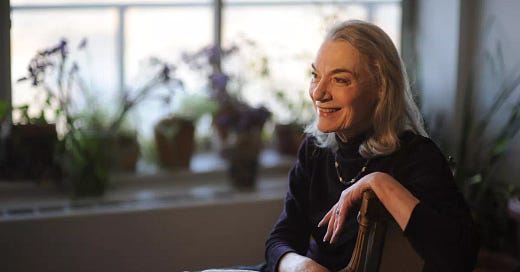Marian Seldes: Rising to the Grand Goal
"We are worthy. We have work to do. We can only become fully sufficient, however, if we pass this on to others."
(When a former student called Marian Seldes in 2004 to discuss some doubts, Marian then called me and said what is printed here. I wrote it down, sent it to her, she made some changes, and it has sat in files until now.)
What I wanted to do for the students I taught and worked with was to make clear to them their worth and to refine their goals. This is not something I could do—that anyone can do—by force: It is done gently, by example, in repeated conversations, rehearsals, sometimes brief moments in hallways or on the street.
We all have ambition. I wanted to be a great actress. I think because of the example of my father, who was a critic, and who took me often to the theatre and introduced me to so many actors and actresses, I understood that I couldn’t have a precise ambition as grand and unrealistic as that one. It is not up to me to decide if I am a great or even good actress. Genetics, fate—who knows what makes an actress great? I could work well, but it would never make me Julie Harris or Geraldine Page or Irene Worth. Those women are gifts—ambulatory gifts—and I don’t know what all contributed to make them great on the stage. I have theories, but that’s not important. What is important, and what is within my grasp, is to work hard and try to be the best actress I can be with what I have been given. I couldn’t make my ambition to play all of Katharine Cornell’s roles, for instance. I couldn’t hope to become Judith Anderson. Those women and their talents and their identities were taken, and I came to see that I wasn’t right for some of the roles they played.
I needed to take on the bigger goal, which was to be of use to the theatre. To be of use to the role I was fortunate enough to be given; to be of use to the other actors working with me; to elevate and honor the work of everyone working on a play; to respect the whole of the theatre. This is a huge goal, and, I think, a good one. You can spend your entire life trying to live up to this goal, but hoping you might play Medea is puny, and if you don’t get cast in that part, and you choose to be disappointed about that, you shrink from anger and resentment. I am not a religious person, but I do believe that there is a place for all of us within our dream, our precise goal to be of use.
Students come to an acting school full of ambition, and I understand that they are eager to see this ambition met with a great challenge, with affirmation, with success. I tried to never reveal this to anyone while I was teaching at Juilliard, but it pained me when a student left in the midst of study because a play or a film had elevated them into a career, and they didn’t have the time to stay and complete the courses. I loved the course of study at Juilliard. I think Michel Saint-Denis and John Houseman and the other teachers who came into the school fashioned a good foundation for the big goal of being useful in acting, in living. However, would I have been able to take the film role or the big play and return to study? I don’t know.
I’ve told you this before: Nothing is out there to help you learn to be comfortable with yourself. I had some remarkable students whose talents dwarfed mine, and I was amazed that they would come to me claiming they didn’t think they looked right. Should they consider plastic surgery? I was looking at young, beautiful students, but because someone of a certain type had succeeded, had been declared “it” for that brief moment of time, I had students considering physical alterations. I witnessed strange diets. I had students who came to see that it limited them to be overweight, so I think it was wise to lose weight: It makes an actor easier to cast in various roles. We did a beautiful production of Bartholomew Fair at Juilliard, and we outfitted someone in a fat suit. It was grotesque and appropriate for the role. That actor could then turn around and play a romantic lead. The fat could be applied for the right part, but it can’t be removed when it’s time to play another. Otherwise, however, I think talent heightens whatever features you are given. I spent a lot of time assuring students that what they had was sufficient to continue, but what was inside of them, their confidence, their faith, needed to be worked on.
What did Marlon [Brando] tell us that night? If only we had gymnasiums for our souls? I think we do, but we run and operate them. It’s within us. I think we have to work on ourselves and assure ourselves that we are sufficient. We are worthy. We have work to do. We can only become fully sufficient, however, if we pass this on to others. They are sufficient. They are worthy.
There can be no five-year plans. There can be no limiting goals. I think whatever you decide to do with your life needs to be the grand goal of your life, and you have to make a lifetime commitment to it. I believe that we rise to this. I believe it is another responsibility of ours to see that others rise as well.
Photograph of Marian Seldes by Jennifer Altman.



